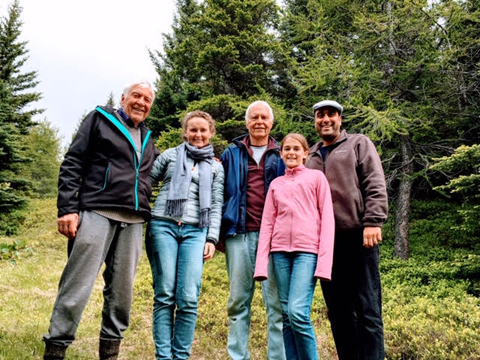 |
 |
|
November 3, 2020 Reforestation in Skógar, Iceland: A Small Social Action Project and Participation in Global Discourses  For Bahá’ís the process of learning to improve material and social reality is guided by these words of Bahá’u’lláh: Be anxiously concerned with the needs of the age ye live in, and center your deliberations on its exigencies and requirements. Bahá’ís are told to serve humanity selflessly and to contribute towards the betterment of the world by applying Bahá’u’lláh’s teachings to the challenges we face. Since the early 1980s the worldwide Bahá’í community has been consciously learning about social action through systematic activity and reflection and through working with others in various fields of social and economic development. Bahá’í communities around the world have been engaged in social and economic development projects for a number of decades. Some of these projects emerge as a result of individual initiative while others emerge as a broad community endeavour, often when small dynamic groups within a population seek to further develop their community. Social action projects are initiated by children, youth or adults regardless of their cultural or religious beliefs. All who participate seek the common good. Universal participation by all, young and old, is the watchword of such endeavours. The desire to promote wellbeing and justice through consultation and collective action is a prominent element of individuals involved in the process. Through their participation in social action, Bahá’ís have increasingly found opportunities to learn about challenges in the field, as well as to participate in global discourses taking place in a range of settings across the world. One such recent opportunity was an invitation for the Bahá’í International Community (BIC) and the Bahá’í Community of Iceland to participate in a global conference organized by “Faith for Nature: Multi-Faith Action”, an initiative aiming to take collective action to protect the planet. Sponsored by the Government of Iceland and the UN Environment Programme, the conference was addressed by the President of Iceland, Guđni Th. Jóhannesson and Bani Dugal, the Principal Representative of the BIC. The story of how the Bahá’í Community of Iceland came to be invited to participate in this global forum is a story of collective effort by a small community learning about the science of reforestation, and the many qualities and skills needed to sustain a project over many decades. It started with one man, Jochum Eggertsson, who was ahead of his time and had a vision of the true “needs of the age” in which we live. Jochum Eggertsson was one of the first people in Iceland to become a Bahá’í. He was the nephew of Matthías Jochumsson, one of the country’s best loved poets and the author of the national anthem of Iceland. During the early 1950s Jochum decided to buy back the farmland Skógar in Ţorskafjörđur (Fjord of the Cods) where his father and ten siblings, including Matthías Jochumsson, had been born, and where the family had lived for generations before losing the farm. Skógar, which is situated in the Westfjords in the north of Iceland means ‘woods’, and Jochum was convinced that it was his mission to revive the woods which had covered the Fjord centuries earlier. During the early 1950s he started to plant trees in one corner of the land. |
|
|